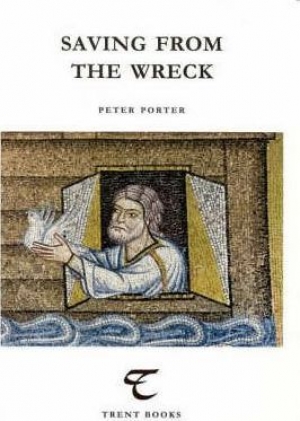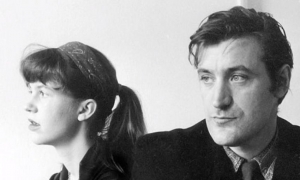Peter Porter
La Trobe University Essay | The Survival of Poetry by Peter Porter
Some years ago I wrote a poem called A Table of Coincidences’, which contained the lines: ‘the day Christopher Columbus discovered America / Was the day Piero della Francesca died.’ This is a verifiable fact, unless changes in the Western calendar have altered things. Clearly, I was being sententious and reactionary: the ancient good of the world and its new doubtfulness seemed to start on the one day. A hostile reviewer pointed out that every date in the world is the anniversary of some other date, and poured scorn on my notion by suggesting that a momentous event like the Armistice in 1918 might share a date with the invention of Coca-Cola. But we still honour anniversaries, and I am only too conscious of the 365 days that have passed since 11 September 2001.
... (read more)Peter Steele reviews 'Saving from the Wreck: Essays on poetry' by Peter Porter
The cover illustration of Peter Porter’s selection of essays shows a mosaic from the Basilica di S. Marco, Venezia, in which Noah leans out from the wall of the Ark and releases the questing dove. The last words of the selection go ...
... (read more)'Ted Hughes and Sylvia Plath: A Bystander’s Recollections' by Peter Porter
I should make it clear at the start of these discursive memories that I knew Ted Hughes only slightly and Sylvia Plath hardly at all. But I lived in fairly close proximity to their ascent to fame in the 1950s and 1960s and knew much more closely some of the personalities intimately involved in the crisis in the lives of these two remarkable poets ...
... (read more)Who was it led us to overestimate the New?
The Greatest Living Poet’s recent volumes
are in a stack at your left hand – what do you do
in between getting on with your journalism?
Go back to his earlier and more spritely days
cool along your face, when you decided,
notwithstanding your resistance, as you claimed,
to literary fashion, that this intransigent
dandy got the world into his impure verses
as almost no responsible rival did –
so much so indeed that a jaunty episode
among the Check-Out Sylphs, an Ode to a Torpedo,
or some sort of squirrel-hounded sexual outing
in the Allegheny Mountains seemed, as you read it,
a calm reflection worthy of Matthew Arnold
minus his Rugby gloom and moral nimbus.
As the grand navigator steps back in his boat,
As the last notes march to Heaven on a page,
So the attenuations of our lives
Are charted as polite reverberations,
Ready to be eroicomico indulgences
Or merely subjects in an academic quiz –
For such is memory’s braking, as the grave
Soul of humankind is shown as nought
On star charts, and each immensity
Aspires to be a simple once-born number.
Early on, my mind was in reverse.
I read a book the name I thought was From
White Cabin to Log House, and ever after
I knew ambition must go to cancrizans.
Peter Craven reviews 'Collected Poems I 1961-1981' and 'Collected Poems II 1984-1999' by Peter Porter
Peter Porter first came to prominence nearly forty years ago as an ironic, tough, rather dandyish poet who wore his Australian expatriatism with a flair and who kept his poetic distance on a London which enthralled and appalled him. He came out with striking lines like ‘I am only the image I can force upon the town’ – all glitter and brittleness – but he was also the kind of poet who could produce the sort of set pieces which seemed to sum up the world of a London which was swinging almost as if it was on a gibbet: ‘All the boys are howling to take the girls to bed’ is the promising opening of ‘John Marston Advises Anger’ which evokes with, yes, sub-Jacobean panache, a time and a place intimately known but still half strange and riddled with the glamour of the stage set, the rhetoric of the nothingness of where it’s at.
... (read more)John Hanrahan reviews 'A.D. Hope' by Kevin Hart, 'James McAuley' by Lyn McCredden, 'Peter Porter' by Peter Steele, 'Reconnoitres' edited by Margaret Harris & Elizabeth Webby, 'Annals of Australian Literature' edited by Joy Hooton & Harry Heseltine
Oxford University Press has begun a welcome series called Australian Writers. Two further titles, Imre Salusinszky on Gerald Murnane and Ivor Indyk on David Malouf, will appear in March 1993, and eleven more books are in preparation. Though I find the first three uneven in quality, they make a very promising start to a series. In some ways they resemble Oliver and Boyd’s excellent series, Writers and Critics, even being of about the same length. However this new series is less elementary, more demanding of the reader. It is, predictably, far sparser in critical evaluation, concentrating on hermeneutics, and biographical information is as rare as a wombat waltz.
... (read more)In the The Automatic Oracle, Peter Porter’s second book since his Collected Poems (1983), this writer is at the height of his powers as a versatile, intelligent, and provocative voice of our times. He is a resistance fighter against false prophecies by disc jockeys, bureaucrats, businessmen, lawyers, academics, politicians and others. Such utterances must be scrutinised or ridiculed because they muddy the language itself, the sources of all oracular wisdom and the hero of this book.
... (read more)




